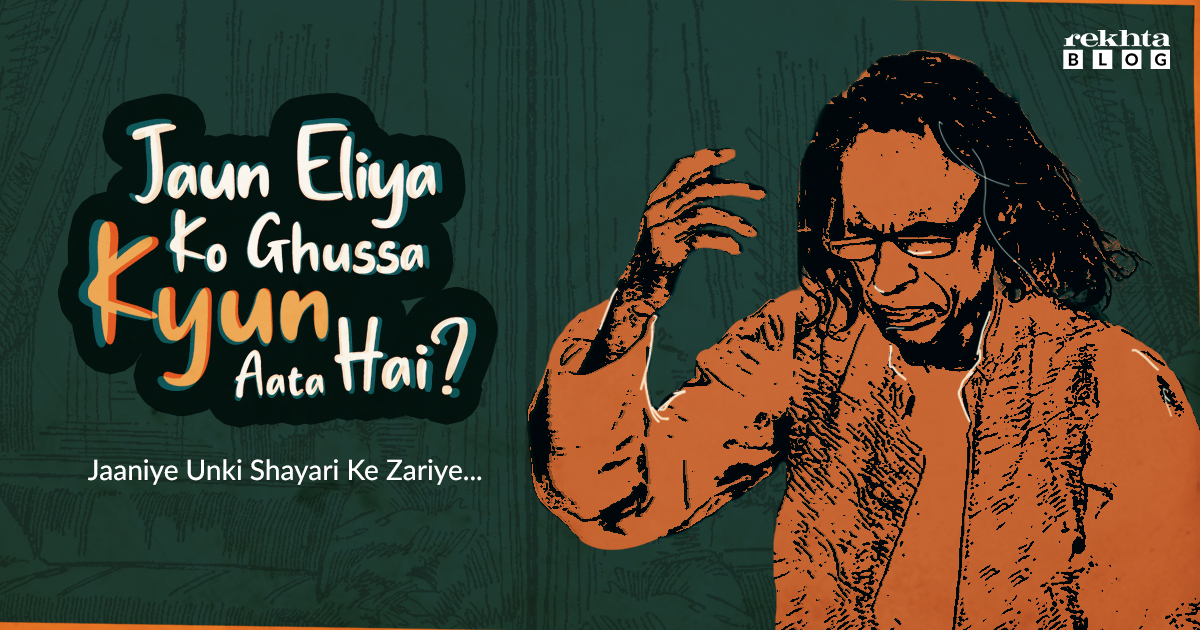
Jaun Elia ko ghussa kyon aata hai?
Jaun Elia, the poet of poignant verses and bitter truths, wasn’t just a name scribbled on pages; he was a melody of anger woven into every couplet. His words weren’t mere expressions; they were daggers dipped in disillusionment, piercing the hearts of those who dared to listen. But why did this man, whose poetry resonated with millions, seethe with such raw, unflinching rage?
Let’s try to find the answer in his verses.
dil ab duniya pe lanat kar ki is ki
bahut khidmat-guzari ho gayi hai
Here, Jaun mocks the world’s hypocrisy. He saw the chasm between ideals and reality, the gilded cages of societal norms, and the blatant injustices that festered like wounds. His anger was a rebellion against the charade and a blatant refusal to swallow the bitter pill of conformity.
mar gaye khvaab sab ki aankhon mein
har taraf hai gila haqeeqat ka
Jaun’s reference to the death of dreams may extend beyond personal goals, including the pursuit of universal peace and equality. He was a devout communist and witnessed the crumbling of his utopian visions. The partition of India, a cruel wound on the map and his soul, left him disillusioned and adrift. His anger became a lament for the shattered ideals, a desperate cry for a world that never was.
Battling alcoholism and depression, Jaun wrestled with his own inner turmoil. His anger was a mirror reflecting the darkness within, a searing protest against the shackles of his own limitations. He writes:
kya takalluf karen ye kahne mein
jo bhi khush hai ham us se jalte hain
Perhaps it was a symphony of all these reasons, each note resonating with bitterness. Jaun’s anger wasn’t a mere outburst but a carefully crafted composition and a relentless yearning for something better.
But Jaun’s anger wasn’t just destructive but strangely cathartic. It allowed him to expose the world’s hypocrisy and vulnerability within. It gave voice to the voiceless, a raw, unfiltered cry against the tide of indifference.
siina dahak raha ho to kya chup rahe koi
kyon cheekh cheekh kar na gala chheel le koi
haan theek hai main apni ana ka mareez hoon
aakhir mire mizaaj mein kyon dakhl de koi
And that, perhaps, is the legacy of Jaun Elia. His anger wasn’t just his; it was a shared burden, a collective sigh of frustration against the absurdity of existence. He didn’t offer answers; he simply held up a mirror, a reflection that forced us to confront the horror within and around us.
So, the next time you hear a Jaun Elia couplet filled with bitterness, don’t dismiss it as negativity. Listen closely, for within that bitterness lies a melody of truth, a testament to the power of one man’s voice to pierce the veil of complacency and awaken the soul.
To read the full Sher collection, Click Here.
NEWSLETTER
Enter your email address to follow this blog and receive notification of new posts.




